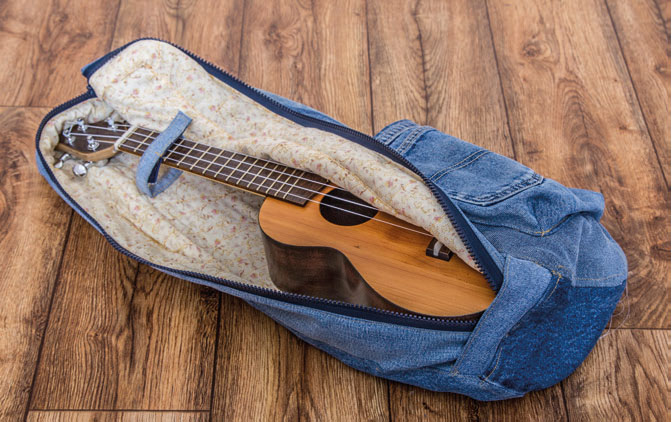
There are many reasons why musicians physically cover instruments and equipment: protection, conveyance, storage – or simply for an impression of tidiness. Sometimes we need a sturdy flight case, perhaps with another case inside as reassurance; for other occasions a simple carry bag or plain covering will suffice.
Many manufacturers produce cases and covers to fit their own products. With luck this may be part of the deal when buying new gear. There are also ranges of generic flight cases, hard cases, gig bags and covers made by companies who specialise in such items. I have even been fortunate sometimes in finding a bag or case that, while designed for something entirely different (gardening implements, car tools or sports kit, for example), fits some musical equipment perfectly.
It is handy to know someone who can make us that humble but necessary cover or case when we can't find exactly the right fit off the peg.
One of a kind
Bespoke covers and bags can be not only ideal for the job but also less expensive than we may at first imagine. Such services seem not to be widely advertised, though they should not remain a well-kept trade secret. They range from sizeable established firms to a single seamstress or sartor.
One of the biggest companies making and supplying covers for speaker enclosures and amplifiers is HotCovers (www.hotcovers.co.uk). I encountered them when looking for a cover for a new Fender amplifier. Although HotCovers lists many well-known (and rarer) brands and models, my chosen amplifier was not in their itinerary of available covers so I contacted them, asking if they would make a one-off. A prompt response offered to do this and, after verifying measurements and material required (and choosing not to opt for a handle hole, which was no problem), I was given a quotation and a link to a payment method. A few days later my cover arrived. It fits beautifully and, although a one-off, seemed to cost no more than ordering a cover for a listed model. Since then it has been used daily, including protecting the amplifier from rain and dust. It still looks and behaves as good as new.

One of Cate Hiscocks’ denim gig bags (© Matt Curtis Photography)
Recently I made a special request for a small cover for an amplifier head: the experience was similar. Opting for a slightly different material this time, I'm equally impressed with the goods so can recommend HotCovers and the company's courteous and professional service.
Perhaps one of the smallest makers of bespoke bags is Cate Hiscocks. Among other skills, she has been a theatrical costume designer and maker. Her speciality for musical instruments is for denim gig bags, usually made from used pairs of jeans, often supplied by the client.
Pictured is a traditional large concert ukulele denim bag (complete with lining, as well as creative and pragmatic use of the jeans’ pockets) oversized enough to fit a ‘mini-uke’ (sopranino) ukulele as a stowaway, or even music books.
A colleague has a more exact fit for his ukulele made from a pair of black denim jeans to enable hassle-free, minimal-baggage train journeys to and from workshops and classes, while a student who plays in a band has a beautifully-made weatherproof amp stand cover, after fruitless searches of the internet and all kinds of bag suppliers for something suitable. Cate can be contacted at catehiscocks@hotmail.co.uk.
Why do guitarists study theory?
Guitarists and theory: often a thorny subject for everyone – except perhaps guitarists? I have been interested in the reactions of my pupils – both adults and children – to ABRSM's revision of their Grade 1-5 theory papers. Broadly speaking, creative questions have been replaced with multiple choice. While I mainly teach Grade 6 onwards, the overwhelming opinion from my students studying up to Grade 5 is that this puts them off. One adult commented that it now looked like a health and safety paper, and he does plenty of those at work, so has now lost interest in AB's music theory exams. The lack of creativity has put off children; most of my younger pupils enjoy theory because of the creative elements. This all rather bucks the idea that guitarists lack any spark when it comes to theory.








